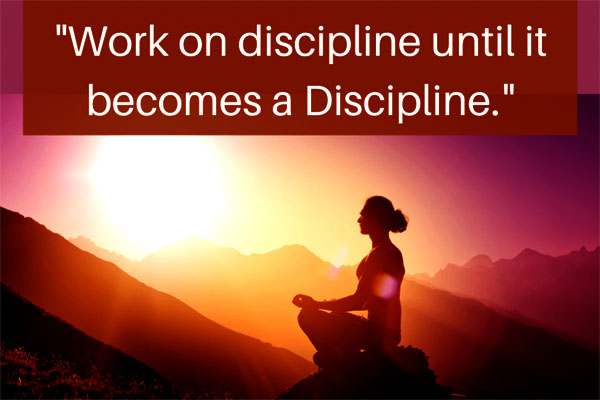Valentine, Discipline Thyself
“Respect your efforts, respect yourself. Self-respect leads to self-discipline.
When you have both firmly under your belt, that’s real power.”
– Clint Eastwood,
Badass, IRL
In ages past I wrote about loving yourself for Valentine’s Day. Here, at the end of February , I’d like to revisit that topic to mention three challenging truths which I have begun to embrace in the four years since writing that first article. I still believe that long term wellness requires self-kindness, self-compassion and living mindfully, yet I’ve had to realize that loving yourself also requires developing a healthy relationship with the parts we don’t like. And that requires self-discipline.
“Self-love involves tuning into ourselves and acting with compassion and caring,” wrote clinical psychologist and author, Monica Vermani, “in short, treating ourselves the same way we would treat someone we love. Self-love involves setting boundaries around our time and energy, prioritizing our goals and needs, making time to sit and process negative emotions when they arise, and challenging our negative self-talk and self-defeating patterns of behavior” (2023).
Did you catch it? Self-discipline is in there. Watch this trick:
Setting boundaries
Prioritizing our goals
Process negative emotions
Challenging our negative self-talk
Challenging self-defeating patterns of behavior
All I did was copy out the applicable parts of Dr. Vermaini’s description of self-love. Well, and add a second “challenging.” Starting to look like self-discipline? Think of this list alongside the American Psychological Association definition of self-discipline; “The ability to quash an impulsive response that undoes our commitment. The capacity to delay gratification, holding out against short-term temptations so we can meet longer term goals…” (Moore, 2020)
Now there’s quashing involved so we’re almost there, right? Let’s look again as I shift the focus from the externally protective love of self to also incorporate internally directed self-discipline.
Setting boundaries on our own behavior. “No, I’m not going to eat that kruller even though I really would love to right now.”
Prioritizing our goals over our momentary wants. “I want to sleep. I would love to sleep. I set the goal of losing weight and gaining muscle to live longer so I’m going to the gym.”
Process negative emotions rather than use them to indulge bad habits. “I feel stressed after work, I’d love a beer. I’m so sad because of the Eagles losing the Super Bowl; bring on the comfort food!” Instead becomes “I’m going to talk to a pal.”
Challenging our negative self-talk when we would love to quit. “I can’t do it!” becomes “It will be a challenge, but I am becoming stronger.”
Challenging self-defeating patterns of behavior even though, at one time, those patterns kept us feeling safe, comforted or were attempts at a self-indulgent self-love. “After the day I had, I deserve this!” becomes “after the day I’ve had, I’m going take a long bath (or walk) and reward myself without calories.”
It’s the same list, just shifting the point of view to supporting the self we want to be over the self we are.
Self-love is a crucial hug we give ourselves in a challenging world. Self-discipline lists the negative parts of us among the world’s challenges and says, “quit hugging and start fighting!” Both are vital to long term health, and both share the same purpose. Self-discipline is self-love. It’s just not as fun!
But look at the benefits: “Reduced risk of obesity – due in part to higher impulse control and the ability to delay gratification. Better muscular and aerobic fitness. Lower likelihood of engaging in risky or criminal behaviors. Greater occupational and career achievement in terms of income and job satisfaction…” As well as improved “emotional control, spending, study habits, attendance to commitments, healthy eating, and household chores” and reduced “perceived stress and unhealthy habits” (Vermani, 2023).
Disciplined self-love seems the key to not just a healthier but happier life. So why is it so hard, and what can we do about it?
(Not) Doing Self-Discipline
“It was character that got us out of bed, commitment that moved us into action,
and discipline that enabled us to follow through.”
– Zig Ziglar,
Author and Speaker
According to Psychologist Catherine Moore “on average, we resist two impulses out of every five that we face daily. In other words, we spend more than half our waking hours trying to resist our urges and impulses. When we don’t resist them, statistics suggest that we act on up to 70% of those desires; but when we do resist, we can decrease that figure to as little as 17%” (2020).
So, if we can increase the amount of disciplined self-loving choices by over 50% when we exert our will, why don’t we?
I’m speaking to myself with this article, as much as to our fine readers. I’ve found that these three reasons seem to be the main drains on loving self-discipline based on research, my clients and myself: We’re too busy, we’re too emotionally driven, and we’re too tired.
Having a perception of being too busy, back to what Dr. Vermani recommends, can be fought by putting healthy boundaries around our time—not just the time we devote to others, but the wasted time we allow ourselves with distraction or delay. “Healthy boundaries are essential to ensuring you have the time and energy to tune into yourself” (2023). Our digital world bids higher and higher for our attention. Even spending 5-15 minutes away from digital—especially social—media allows us to focus our attention on ourselves and our goals. Even more, it pulls us out of the fast pace of modern life and gives us space to return to a healthy, calmer rhythm from which we can make more self-empowering choices.
I’ve heard for years that willpower is a muscle, and there is much evidence to support it. I found, writing this article, that there have been studies to the contrary as well. These studies show that choosing to believe that our will can be worn down is just that: a choice. “Choosing not to view self-control as a depletable resource” has been shown to “give us some of the motivation we need to overcome, at least mild cases of, ego depletion.” Even more interestingly, these studies showed that by “practicing self-control, we can build up our willpower just as we build up fitness by exercising” and that sticking to regular physical exercise or a specific diet, “which in itself involved repeated acts of willpower” has been shown to significantly enhance that willpower over time (Moore, 2020). It’s a win-win! Seeing yourself as having an inexhaustible will and making those healthy choices, actually increases our willpower’s endurance!
Finally, being too emotionally driven. As a counselor, I’m an emotional guy and I live in a world of emotions. Like the time perspective-shift, the key to getting your self-discipline energy back is to stop. Not stop feeling, stop doing. We can manage our emotions with thought, we can manage them with physical activity but if we do not stop our automatic, task oriented, high-speed “doing all the things!” then we don’t manage our emotions, they manage us.
Stopping and identifying how we’re really feeling in the moment gives us back the power to problem solve effectively. If I’m frustrated, I cannot resolve the source of the frustration with a bag of chips—no matter how big a bag, unfortunately. I can get out my laptop and make a plan, though. If I’m sad, working late, watching TV or mindlessly scrolling and avoiding my physical exercise routine will make things worse. But stopping to call a friend, write it out—even crying it out, can further resolve those feelings and give us our will back.
Taking the time to think and feel mindfully allows us the ability to use our self-kindness and self-compassion in service of our self-discipline, not to indulge but to strengthen ourselves and our will.
So, I encourage you, as I encourage myself on this last day of February. Take the time to check in with yourself and show yourself love in all its aspects; kind, mindful compassionate and disciplined.

Moore, C. (2020) 17 Self-Discipline Exercises to Help Build Self-Control. Positive Psychology.com. Retrieved from: https://positivepsychology.com/self-discipline-exercises/
Vermani, M. (2023) What’s self-love got to do with it? Psychology Today. Retrieved from: https://www.psychologytoday.com/intl/blog/a-deeper-wellness/202302/whats-self-love-got-to-do-with-it



 Previous Post
Previous Post Next Post
Next Post